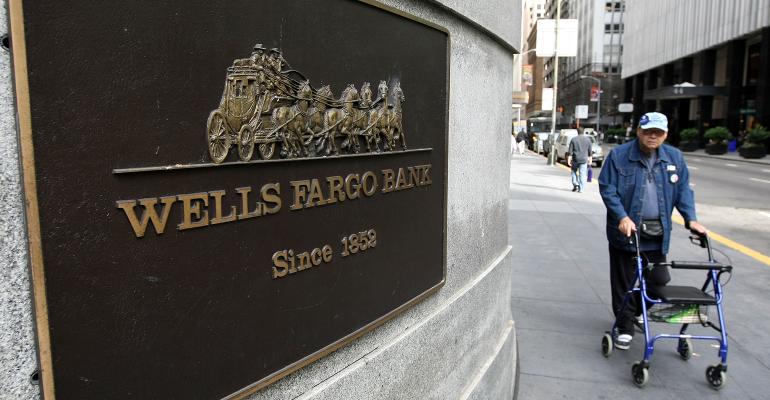(Bloomberg) -- Consumers have lodged countless complaints about how Wells Fargo & Co. employees opened sham accounts in their name. Recently, a Wells Fargo & Co. employee pointed her finger at the company for a different kind of financial pain—the hit to her 401(k) retirement savings account, due to a 12 percent drop in the company's stock in the wake of the cross-selling scandal. The proposed class-action lawsuit alleges that Wells Fargo "intentionally withheld material non-public information from Plan Participants invested in Wells Fargo stock and the public at large about a criminal epidemic at Wells Fargo associated with a critical component of Wells Fargo's business model and key driver of its stock price—i.e. cross-selling."
It states that the company knew its stock was "artificially inflated" but allowed employees in the $35 billion plan to keep investing in it through both the employee-stock ownership plan (pdf) and a non-ESOP fund. The matching contributions made to Wells Fargo employee accounts are automatically made in the form of company stock, according to the complaint.
Wells Fargo didn't immediately respond to a call seeking comment on the lawsuit.
Recently, similar proposed class actions, by employees of Whole Foods Corp., BP PLC, and RadioShack Corp., were rejected by the courts, which found that the employees hadn't met the Supreme Court's threshold for suits over stock losses. And just this month the plaintiff in a suit against Sanofi-Aventis U.S. LLC was found to lack standing.
So let us repeat: Don't sink a big slug of your retirement money into your company's stock, unless there's a compelling reason to do so.
Even if your company is squeaky clean (as far as you know), you're exposed to its fortunes and its industry's ups and downs just by virtue of working there, especially if you get compensation in the form of stock options. Why double or triple down on the risk? Especially if you work in financial services (see Scandal, Libor; Manipulation, Forex Market; etc. etc.).
If you're still not convinced, consider this scary thought, from financial adviser William Bernstein, author of The Investor's Manifesto: Preparing for Prosperity, Armageddon, and Everything in Between.
One bit of traditional advice about managing your "human capital"—your earning potential—is to ask: Am I a stock or a bond? If you're in an industry such as financial services that's more cyclical or volatile, like a stock, you want a greater emphasis on bond-like investments to balance out your portfolio risk. If you're a tenured professor, on the other hand, you're more like a bond and so should invest more heavily in equities.
Today we're all arguably more stock-like, with such trends as tenure coming under attack, traditional pension plans increasingly rare, cuts to public pension fund benefits once thought sacrosanct, and social safety nets under ever greater financial stress. At the same time, it's hard to eke a decent return from bonds these days, and that has more advisers urging investors to beef up the stock portion of their portfolio and hold that stock longer than they may have in the past. It all adds another layer of risk to our financial lives.
Bernstein says hang on. It's worse than that.
Instead of asking, are we a stock or a bond, we should be asking are we a lottery ticket or a bond.
"For the most part, although our human capital has gotten riskier, the average return on it hasn't moved higher, at least not in developed nations," Bernstein said in an e-mail. What's new now, he said, "is that there's a much bigger positive skew: A very few people at the top do spectacularly well and make millions and retire, if they want, at age 33. That didn't exist 6o years ago. But on average, and certainly at the median, the return on human capital hasn't increased. Hence, lottery versus bond."
Maybe you feel investing in your company is "safer," since you're familiar with the business. But history shows that a company's vulnerability can be far from apparent, even to insiders.
And the trend is against you. A little more than 30 percent of plans now limit how much can be invested in company stock, according to data from the Plan Sponsor Council of America. Ten years ago, 17 percent of plans had more than 50 percent of total plan assets in company stock, compared with 6.6 percent of plans today.
Yet the percentage of companies offering employer stock as an investment option in a 401(k), while down, is still significant. For all companies, public and private, it was 34 percent last year, down from 39 percent in 2013, according to Aon Hewitt. Among companies with publicly traded stock, it's shockingly high, at 63 percent.
Whether your career is best represented as a stock, a bond, or a lottery ticket, the best strategy for the long run is to keep the bulk of your retirement money in diversified, low-cost index funds or in a low-cost, target-date fund.
We're glad you believe in your company. But you wouldn't believe what could happen to its stock.
To contact the author of this story: Suzanne Woolley in New York at [email protected] To contact the editor responsible for this story: Peter Jeffrey at [email protected]





